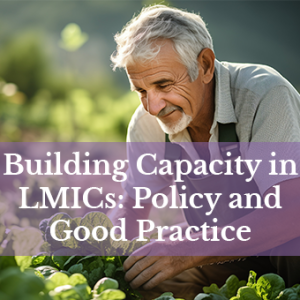
Ageism and social belonging in Canada through an intersectional lens
Presenter(s):
Jolene Skordis; Alison Marshall; Cherian Mathews, Age International, United Kingdom
Abstract
Over 120 million people worldwide are currently forcibly displaced. Numbers have been rising for each of the past twelve years, having more than doubled over the last decade. Among the refugees, asylum-seekers, and internally displaced persons are many older people. The Russia-Ukraine war, crises in Sudan, South Sudan, Afghanistan, Palestine, DRC, Syria and elsewhere have swelled the ranks of those on the move.
Older people are particularly vulnerable during conflict, and other drivers of displacement such as natural disasters, due to disability and potential isolation. Often, they are the ones who are left behind, or they choose to stay, while other generations flee, leaving them exposed to a range of risks. If they do move, the journey, and managing in a new environment, such as a temporary shelter, or refugee camp, can be particularly difficult. Older people also face challenges accessing aid and services, as well as age-discrimination and exclusion.
Older people often face difficulty travelling long distances, climbing stairs or navigating crowds. They may be more susceptible to illness, injury and complications from existing health conditions. Memory problems, confusion, and difficulty understanding instructions can make it harder for older people to cope, and stress and anxiety can lead to mental health challenges. Due to digital exclusion or sensory impairment, older people may miss out information about evacuation plans or support. Older people may have difficulty communicating their needs to health workers or authorities. Many grandmothers have responsibility for grandchildren, and may also provide care for other older people, making displacement all the more difficult.
Older people too frail, or unwilling, to move, may lose families, friends and support networks as others flee, leaving them isolated and lonely. Older people, particularly older women, are vulnerable to theft and abuse, especially if living alone, or in unsafe environments.
We also know that older people can be impressively resilient. They use their skills and experience to assist others. Older people in Ukraine, for example, work as volunteers assisting other older people arriving in their city, to find accommodation and medical assistance. But policy-makers do not pay enough attention to either the needs or the contribution of older people.
Given the range of challenges facing older people affected by conflict and displacement, this panel will consider what’s working to support them. It will look at good practice, and how policies and decisions which include older people can mitigate the worst impacts. We will ask what long- and short-term strategies are effective and which interventions are most important. This is an opportunity to think together about approaches to support older people better as growing numbers across the world face conflict and displacement.
We suggest a panel including speakers from different regions including Africa, Asia and Eastern Europe. It would be great to invite representatives from UN agencies such as UNHCR, UNOCHA, WFP etc if any are based in South Africa or could come in from Nairobi.
Jolene and Alison are both happy to moderate or speak.
Bio(s):
Jolene Skordis is a Professor of Economics, specialising in health and development. She is Vice-Dean (International and Advancement) for UCL’s Faculty of Population Health Sciences, Head of the Department of Environment and Community Health, Chair of the European Global Health Research Institutes Network, a Senior Research Fellow at the Institute for the Future of Work and a Fellow of the Royal Society for Public Health. She is a regular advisor to the WHO, World Bank and the Global Fund. She works primarily within randomised trials of complex public health interventions, with research programmes spanning fiscal space for sustainable and scalable health service delivery, anti-poverty programmes, gender empowerment, social networks to support behaviour change and the promotion of health equity. Her work has directly influenced government policy in a range of countries.
Cherian Mathews is Chief Executive of HelpAge International, leading the organisation’s global work to promote the wellbeing, dignity and rights of older people.
Cherian has more than 30 years of international development experience in leading and managing humanitarian, long-term development and campaign work at country, regional and global levels.
Previously, he worked with Oxfam GB as International Programme Director and before that as Asia Regional Director, where he led major humanitarian responses in the Philippines and Nepal and led regional campaigns on economic justice and inequality.
Before joining Oxfam in 2003, Cherian worked with Action Aid. Prior to that he worked with local and national level organisations on the rights of indigenous and other marginalised communities in India.
Alison is CEO of Age International and a member of the Age UK Senior Leadership Team. She leads Age International’s work on the needs and rights of older people across low- and middle-income countries, overseeing governance, advocacy, fundraising, communications, programme funding and humanitarian work.
Alison has over 25 years’ experience in international development. She was previously Managing Director of Sense International, working for and with people with disabilities. Before that she held senior roles at the International Planned Parenthood Federation, UNICEF UK, Bond and CAFOD. Her work on human rights has seen her travel extensively, most recently to visit work with older people in India, Rwanda, Vietnam, Pakistan and Tanzania.
Alison is on the Boards of the Disasters Emergency Committee, INTRAC and the Fairtrade Foundation.
She holds a MSc in NGO Management from Bayes Business School, a LLM in Human Rights from the University of London, and MAs from Sussex University and from Cambridge University where she studied Geography.
